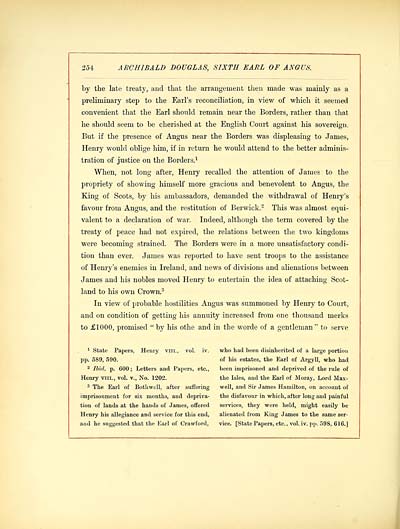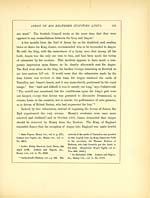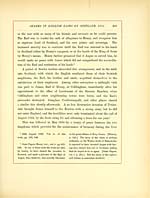Douglas book > Angus memoirs
(278) Page 254
Download files
Complete book:
Individual page:
Thumbnail gallery: Grid view | List view

254
ARCHIBALD DOUGLAS, SIXTH EARL OF ANGUS.
by the late treaty, and that the arrangement then made was mainly as a
preliminary step to the Earl's reconciliation, in view of which it seemed
convenient that the Earl should remain near the Borders, rather than that
lie should seem to be cherished at the English Court against his sovereign.
But if the presence of Angus near the Borders was displeasing to James,
Henry would oblige him, if in return he would attend to the better adminis-
tration of justice on the Borders. 1
When, not long after, Henry recalled the attention of James to the
propriety of showing himself more gracious and benevolent to Angus, the
King of Scots, by his ambassadors, demanded the withdrawal of Henry's
favour from Angus, and the restitution of Berwick. 2 This was almost equi-
valent to a declaration of war. Indeed, although the term covered by the
treaty of peace had not expired, the relations between the two kingdoms
were becoming strained. The Borders were in a more unsatisfactory condi-
tion than ever. James was reported to have sent troops to the assistance
of Henry's enemies in Ireland, and news of divisions and alienations between
James and his nobles moved Henry to entertain the idea of attaching Scot-
land to his own Crown. 3
In view of probable hostilities Angus was summoned by Henry to Court,
and on condition of getting his annuity increased from one thousand merks
to £1000, promised " by his othe and in the worde of a gentleman" to serve
1 State Papers, Henry viii., vol. iv.
pp. 589, 590.
2 Ibid. p. 600; Letters and Papers, etc.,
Henry nil., vol. v., No. 1202.
3 The Earl of Bothwell, after suffering
imprisonment for six months, and depriva-
tion of lands at the hands of James, offered
Henry his allegiance and service for this end,
and he suggested that the Earl of Crawford,
who had been disinherited of a large portion
of his estates, the Earl of Argyll, who had
been imprisoned and deprived of the rule of
the Isles, and the Earl of Moray, Lord Max-
well, and Sir James Hamilton, on account of
the disfavour in which, after long and painful
services, they were held, might easily be
alienated from King James to the same ser-
vice. [State Papers, etc. , vol. iv. pp. 598, 616.]
I
ARCHIBALD DOUGLAS, SIXTH EARL OF ANGUS.
by the late treaty, and that the arrangement then made was mainly as a
preliminary step to the Earl's reconciliation, in view of which it seemed
convenient that the Earl should remain near the Borders, rather than that
lie should seem to be cherished at the English Court against his sovereign.
But if the presence of Angus near the Borders was displeasing to James,
Henry would oblige him, if in return he would attend to the better adminis-
tration of justice on the Borders. 1
When, not long after, Henry recalled the attention of James to the
propriety of showing himself more gracious and benevolent to Angus, the
King of Scots, by his ambassadors, demanded the withdrawal of Henry's
favour from Angus, and the restitution of Berwick. 2 This was almost equi-
valent to a declaration of war. Indeed, although the term covered by the
treaty of peace had not expired, the relations between the two kingdoms
were becoming strained. The Borders were in a more unsatisfactory condi-
tion than ever. James was reported to have sent troops to the assistance
of Henry's enemies in Ireland, and news of divisions and alienations between
James and his nobles moved Henry to entertain the idea of attaching Scot-
land to his own Crown. 3
In view of probable hostilities Angus was summoned by Henry to Court,
and on condition of getting his annuity increased from one thousand merks
to £1000, promised " by his othe and in the worde of a gentleman" to serve
1 State Papers, Henry viii., vol. iv.
pp. 589, 590.
2 Ibid. p. 600; Letters and Papers, etc.,
Henry nil., vol. v., No. 1202.
3 The Earl of Bothwell, after suffering
imprisonment for six months, and depriva-
tion of lands at the hands of James, offered
Henry his allegiance and service for this end,
and he suggested that the Earl of Crawford,
who had been disinherited of a large portion
of his estates, the Earl of Argyll, who had
been imprisoned and deprived of the rule of
the Isles, and the Earl of Moray, Lord Max-
well, and Sir James Hamilton, on account of
the disfavour in which, after long and painful
services, they were held, might easily be
alienated from King James to the same ser-
vice. [State Papers, etc. , vol. iv. pp. 598, 616.]
I
Set display mode to:
![]() Universal Viewer |
Universal Viewer | ![]() Mirador |
Large image | Transcription
Mirador |
Large image | Transcription
Images and transcriptions on this page, including medium image downloads, may be used under the Creative Commons Attribution 4.0 International Licence unless otherwise stated. ![]()
| Histories of Scottish families > Douglas book > Angus memoirs > (278) Page 254 |
|---|
| Permanent URL | https://digital.nls.uk/96535130 |
|---|
| Attribution and copyright: |
|
|---|---|
| Description | A selection of almost 400 printed items relating to the history of Scottish families, mostly dating from the 19th and early 20th centuries. Includes memoirs, genealogies and clan histories, with a few produced by emigrant families. The earliest family history goes back to AD 916. |
|---|

